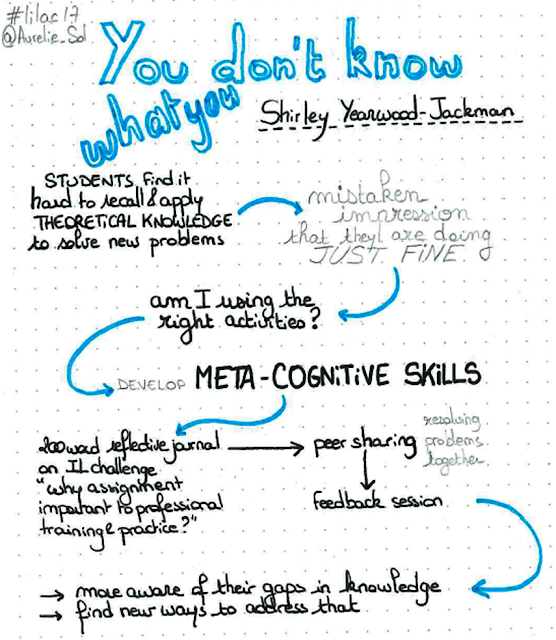I enjoyed
Lilac way more than I should admit; it was such a blast!
I got lucky to have
my own session out of the way quite quickly so I was set free from worry early on.
Lots of lovely people came up to talk with me - which is really perfect when your introverted self has a hard time going towards people you don't know. I'm very grateful to everybody who came by and said hi!
But aside from the social side, I also enjoyed all of the talks I went to wholeheartedly.
Reflection
So, let's reflect a little on the actual content of the conference.
(That's a lot of text down there, but if you scroll down a bit you'll find pictures!)
- I loved learning about teaching students how to create better research topics. That's not something I've taught before, but now I really want to pitch it to the tutors I'm working with!
- Anne-Marie Deitering explained that if students seem to be lacking curiosity in their choice of topics, it's because they tend to go for the "safe" option. It's hard to be adventurous when what you do is going to determine your grades!
- Mason Brown came up with a great program to teach pre-freshmen how to ask good questions, and it's all based on panels from comics. It's such a great idea and he seems to have had a lot of success! I would love to try it out on my students...
- Innovative systems for iSkills programs:
- Librarians from the University of Liverpool came up with an innovative way to organise all the different workshops that were being proposed throughout the university: by managing it as if it was a start-up.
- The IDEA model demonstrates how to merge instructional design with information literacy to create bespoke iSkills training for a specific course.
- Librarians tend to create games that teach mechanics or test knowledge. But it's actually better to just use game mechanics to frame your normal content. It was great to see how Catherine Fahey and Marcela Y. Isuster have successfully been doing it for a pre-freshman course.
- Using the actual standards of the profession your students are going to integrate is a great way to drive home the point that information literacy is for life, not just for university. And that they will be expected to use the skills you're teaching them during their professional lives.
- Avoiding to do the same thing over and over...
- Training other professionals
My Notes
A foreword before the actual notes:
I've always loved taking non-linear notes... But the week before Lilac, I learned about a technique called Sketchnoting, and decided to try and use it throughout the conference.
I'll tell you more about how it works next week... But for now, I just wanted to warn you that my notes look a little different that what you're probably used to. And they're not typed up. But I hope you enjoy them anyway!
21/03/2016 – Publication without tears: tips for aspiring authors, by Emma Coonan, editor-in-chief of the Journal of Information Literacy.
Link to abstract.
21/03/2016 – Peer Support for the Development of Information and Digital Literacy Skills at the Institute of Technology Tallaght, by Philip Russell and Dr Gerard Ryder.
Link to abstract.
21/03/2016 – Copyright Literacy in the UK: tackling anxiety through learning and games, by Jane Secker and Chris Morrison.
Link to abstract.
22/03/2016 – Playing for Keeps: Game Design and Implementation for Long-Term Learning, by Catherine Fahey and Marcela Y. Isuster.
Link to abstract.
22/03/2016 – Keynote by James Clay
22/03/2016 – Great IDEA: An Instructional Design model for Integrating Information literacy, by Kimberly Mullins.
Link to abstract.
22/03/2016 – Masters of the UniVerse! By Holly Singleton and Phil Jones.
Link to abstract.
22/03/2016 – Does the research paper kill curiosity? Collaborating with faculty to support learning and exploration, by Anne-Marie Deitering.
Link to abstract.
22/03/2016 – All you need to startup is KnowHow: creating a scalable information literacy programme at the University of Liverpool, by Nicola Kerr and Zelda Chatten.
Link to Abstract.
23/03/2016 – Is it a bird? Is it a plane? What can students learn asking questions about comics? By Mason Brown.
Link to abstract.
23/03/2016 – Using professional standards to inform information literacy work, by David Bedford.
Link to abstract.




























